PITCH PERFECT & The Predatory Lesbian
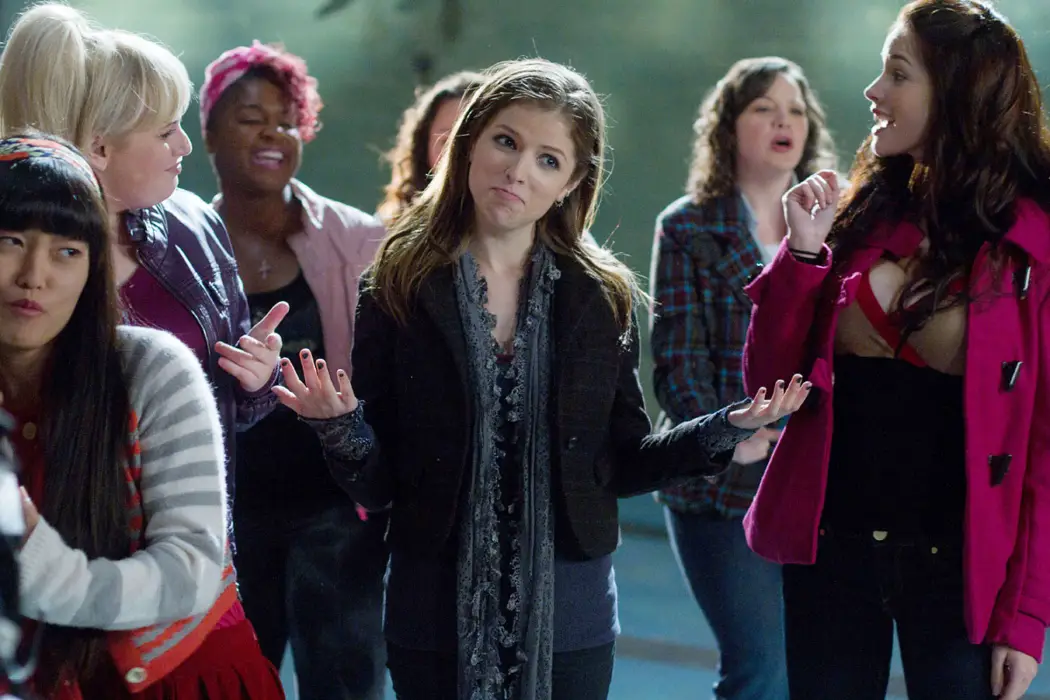
Film critic, Ithaca College graduate, University of St Andrews masters…
There aren’t many contenders for the title, but until we get the Captain Marvel sequels, the Pitch Perfect trilogy will unfortunately continue to be the queerest mainstream film series of all time. It’s an award that the series doesn’t so much earn as it has handed to it because there simply aren’t many other possibilities.
Pitch Perfect welcomes discussions of queerness, and the affections of its heroine, Beca (Anna Kendrick), pendulate scene to scene between guys and gals. The series gets close to depicting same-sex romance, though. Every entry teases a lesbian relationship for Beca before carjacking the Sapphic stuff and leaving her stranded with a dull male schmooze pal.
But regardless of whom she winds up with, Beca’s still sexually ambiguous. Sticking her with a guy at the end of the movie doesn’t erase the bisexual teases that come before it, but due to the absolute dearth of same-sex couples in Hollywood movies, Pitch Perfect’s unwillingness to pursue a lesbian relationship is a severe missed opportunity.
The series appears on all fronts to be queer-friendly, entertaining questions about Beca’s sexuality and encouraging the character to flirt with girls as much as guys. Is Beca a repressed lesbian? Or is she bisexual? Will she follow through with her comments about how hot the female competitors are? The films give the character room to seriously explore her own potential bisexuality, even if they trip over themselves every step of the way.
The queerest question of the franchise is the constant will-they-won’t-they of Beca and her friend, Chloe (Brittany Snow). They flirt with each other relentlessly. Will she and Chloe ever do anything besides talk? Beca’s got a much better rapport with her than she does with Boring Dude No. 1 (Jesse, played by Skylar Astin) or Pitch Perfect 3’s Boring Dude No. 2 (music producer Theo, played by Guy Burnet).
But alas, film after film, the series turns its back to its own queer leanings. The trilogy abuses queerness whenever it can. It indulges in predatory depictions of homosexuality, and it queerbaits its audience with the ultimate gay siren song: Beca’s teased hookup with Chloe. So why’s it the queerest mainstream film series ever? We’re so starved for queer content that Pitch Perfect, which is a slap in the face to queer people everywhere, can win by default.
Singing In The Shower
The first film seems innocuous enough. It’s a standard talent show – structured musical comedy about a cappella. Its cookie-cutter story sees Beca go to the fictional Barden University, where she’s drafted into the ranks of an underdog all-female a cappella group, the Barden Bellas, alongside Fat Amy (Rebel Wilson) and a medley of other misfits, all intent on redeeming the group’s reputation. It’s benign, fun and eminently quotable — Fat Amy’s “les-be honest” has taken on a life of its own.
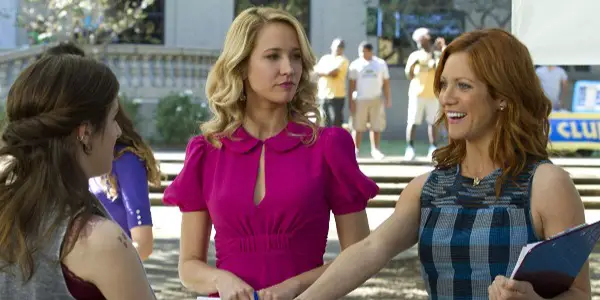
The film’s first 20 minutes are timid. Beca moves into her dorm room and during a club fair, rejects an offer to join the Bellas when Chloe and Aubrey (Anna Camp) try to draft her. Pitch Perfect plays things oddly safe from this point forward. The film’s afraid to break convention by diving head-first into the lesbian undercurrents of an all-female singing group comprising of extremely attractive college-aged women. Instead, every girl-on-girl encounter is scary and alienating — and not just in a freshman-year-of-college sort of way. Screenwriter Kay Cannon (who worked on all three films) and director Jason Moore (who didn’t) are incapable of melding the queer themes into the story organically and inoffensively.
At that 20-minute mark, Beca strolls into the dorm shower, singing “Titanium”. Two pairs of feet (a guy’s and a girl’s) in an adjacent stall pivot, following the music. Beca sings in the shower, naked, while unbeknownst to her, someone enters the stall, quietly pushing the curtain aside.
My mind immediately jumped to Psycho and the sudden murder of Janet Leigh’s character. “Get out of there, Beca!” I wanted to yell. Though Kendrick’s character is not stabbed to death in the first act of Pitch Perfect, the scene has an unmistakable air of uneasiness. On my second watch, I was squirming — if a guy were to do the same thing to Beca, it would be terrifying.
But the scene isn’t supposed to be scary — we’re meant to laugh. Is it funnier when a woman approaches Beca, naked, prying, refusing to leave? I’d prefer if a film didn’t try to spin laughs from sexual harassment.
Beneath the fear, there’s obviously some lesbian vibes Chloe’s forcing on Beca. Chloe compliments Beca on her singing, and Beca, clearly uncomfortable, says, “I can’t concentrate on anything you’re saying until you cover your junk.” This is a point Beca will continue to make for the rest of the scene. I’m naked, you’re naked, and I’m uncomfortable — why are you still standing there? It’s a predatory meet-cute that feels as though it was ripped right from a John Hughes movie.
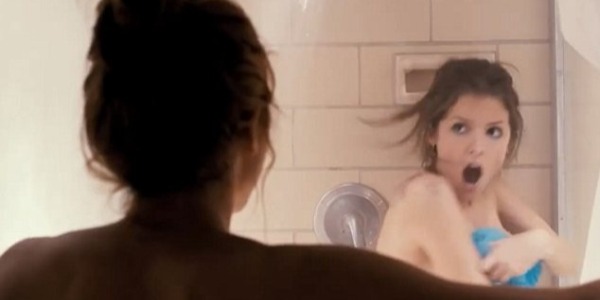
Cannon clearly wanted to create a lesbian-leaning college comedy, but the film too often confuses sexual harassment with flirtation. “That song is my jam. My lady jam,” Chloe intones to Beca, slathering on the come-ons. “Song really builds.” I suppose the joke is that Chloe masturbates to a David Guetta song. Gross.
Chloe cornering a nude Beca in the shower and forcing her to finish singing “Titanium” isn’t the queer relationship we deserve. But it’s enough for the scene to make its Tumblr rounds among teens who don’t recognize the creepy perversity of the behavior and aren’t fully aware of the terrible things that happen to women on college campuses.
Besides the shower scene and some mildly suggestive comments sprinkled throughout the movie, Pitch Perfect doesn’t lob many balls into the Bechloe camp. Chloe approaches her, drunk and giddy, at a party, but it’s to solidify their friendship, not to flirt.
Yet that initial shower scene makes it fair game to consider all of Beca’s and Chloe’s scenes in the series within a queer context, even if the movies don’t give us much but scraps. Perhaps we’re supposed to bear in mind how little Hollywood actually cares about queerness and be grateful we’re getting anything even remotely suggesting bisexuality — as Sam Spade said to (the definitely queer) Joel Cairo in The Maltese Falcon, “When you’re slapped, you’ll take it and like it.”
Hetero Fear And Cynthia Rose
Besides the bisexually coded Chloe and Beca (there are never any solid declarations of sexuality), Pitch Perfect also has Cynthia Rose (Ester Dean), the only explicitly lesbian character in the series. She’s a shudder-inducingly awful character, one of those people who makes you cringe every time they show up.
Cynthia’s a butch African-American lesbian, and she’s misgendered on arrival. “Whenever you’re ready, dude,” one of the bros from the all-male a cappella group says at the start of her audition. She removes her cap and shows off her longer, dyed hair — what a twist! It’s a woman! “Oh, not a dude,” the guy says, clearly confused.
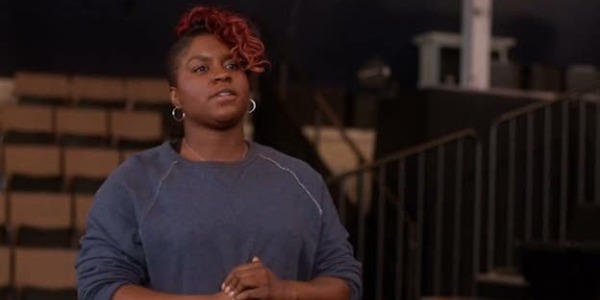
The scene would be sympathetic to Cynthia, but it’s communicated from the dude’s perspective. It’s a joke about her physical appearance, one that doesn’t work unless we, too, believed that Cynthia was a guy when she first walked onstage. Isn’t it fun to assume people’s identities?
I wish Cynthia were a sympathetic character because of this initial incident, but she quickly throws all good will out the window — she’s another predator. She’s sexually threatening in the way that most straight white men see gay black women. Cynthia’s the flesh-and-blood rendering of hetero fears that all butch black lesbians are aggressive and perpetually horny people who can’t resist staring at women’s bums or grabbing their breasts.
It’s the only natural psychological jump from sexual desire. Straight men love lesbians — part of me believes the shower scene is solely in place for them — and they lust after lipstick femme lesbians especially. But once a lesbian is given masculine traits — butchness, for example — straight men don’t know what to do, so they begin to make dangerous associations. Cynthia’s out there abusing women and, heaven forbid, stealing them from straight guys.
But Cynthia’s scenes also reek of male fantasy, just as the shower scene does. The male gaze is strong in this one. Not only does Cynthia help to justify for heterosexual people why women need men in the first place — to protect them from aggressive, creepy lesbians — but Cynthia also gets to touch and fondle hot girls. Remember, this one’s directed by a man.
“When I drink too much tonight, can I count on you to hold my hair back if I puke?” Stacie (Alexis Knapp) asks Cynthia at a party. The Bellas are each oversimplified stereotypes, and for those of you who forget exactly which girl is Stacie, she’s the hot one. When she asks Cynthia if she can rely on her, Cynthia, naturally, stares at Stacie’s breasts, as if considering what else could happen if this hot girl gets too drunk. Later, during a rehearsal montage, Cynthia keeps looking at her ass.
It’s all thoroughly creepy, but if those instances seem more knowingly goofy than predatory, the film doesn’t want you to have any illusions. A fight breaks out at practice one day, and Cynthia tries to keep Stacie out of it. She roughly grabs Stacie’s boob and holds her back while shouting “I’ll protect you” — Stacie clearly is uncomfortable with it — and when Beca enters and the Bellas freeze in a mid-fight tableau, we’re treated to a gag shot of Cynthia with her hands planted on Stacie’s butt. I’m pretty sure Stacie blows a rape whistle at one point in the fight.
Similarly, when Fat Amy is burrito-bombed at a gas station, Cynthia is the first responder, taking the opportunity to straddle her and attempt (unnecessary) mouth-to-mouth. Fat Amy, like Stacie, is disgusted — Cynthia never receives consent, yet she continues to act this way. You can practically hear the clock ticking backward on the gay rights movement.
The film uses its lesbian character as a punching bag, between the constant jokes about her sexual harassment of Stacie and Fat Amy’s own homophobic jabs toward her. (The sequels thankfully sand down Amy’s rough edges, including the mild homophobia and blatant anti-Semitism she shows in the first movie.)
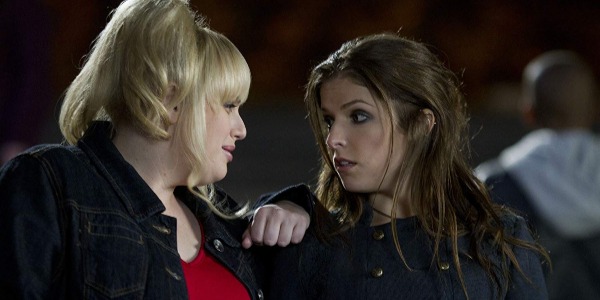
Fat Amy spends the film outing Cynthia to the other Bellas. It’s hardly a welcoming group — if you don’t conform to them, there’s a good chance they’ll talk about you incessantly behind your back. Just because Fat Amy insists on introducing herself via her moniker to beat the girls to the insult doesn’t mean she has the right to joke about everyone else. She’s supposed to be an endearing, charming, funny character, right?
Fat Amy can’t wait for Cynthia to come out. When she casually drops that she had a girlfriend, Fat Amy says, “Whoop, there it is,” turning what Cynthia thought was going to be an inconsequential comment into a big deal. Every scene featuring Cynthia transforms into a doubling-down on her otherness. It’s bad enough that she’s the sole black woman in a very white group, but she’s also the sole out lesbian among a mostly heteronormative bunch.
These films are made for and marketed to teenagers. I saw the first film when I was on a date in high school, and my girlfriend and I both enjoyed it. Neither of us understood the dormant homophobia in the movie.
What makes Pitch Perfect especially difficult to parse through is its genre — it’s a comedy, so you want to laugh. High schoolers don’t watch Pitch Perfect expecting it to be a snooze. So after you’re on the film’s wavelength, jokes you might otherwise find abhorrent become palatable. In high school, we saw Cynthia and her overt sexual harassment of the other Bellas and the conversation in school the next day was about that a cappella movie and how funny it is. We internalized the messages the movie was offering us by laughing with them. Rape jokes sell because young, straight audiences can’t tell how disgusting they are.
Ideas, thoughts and feelings take root in people when their environments reinforce them. Pitch Perfect probably didn’t and won’t make anybody homophobic, but if you’ve heard jokes about gay people before and you go to see Pitch Perfect, maybe you’ll be a little more likely to take those jokes for truths. The film may reinforce homophobic attitudes you already have. And suddenly, it seems like Pitch Perfect is less of a positive force, less a light breeze signaling change, and more a Trojan horse for homophobic sentiments.
Conclusion
Paradoxically, the Pitch Perfect series is both the most queer mainstream film series and also horribly homophobic. The first film is really not that queer at all. After we get a properly gay or bi series, Pitch Perfect will only be remembered as the series to have blackjacked its fanbase into thinking it’s queer-friendly.
It’s not utterly destructive — with a mostly female main cast and a keenness to engage with female relationships, Pitch Perfect already stands tall amidst a field of male-dominated comedies. And for 2012, the film incorporates queer sexualities in a way that some would see as progressive. I can’t think of many other high school–targeted movies at the time that included queerness, however insignificantly.
The series, however, is to 2010s queerness as Charlie’s Angels is to 1970s feminism. Both are steps ahead for an industry in which the unwillingness to change is a full-fledged business model. Though they were initially hailed as being more game-changing than they actually are, their biggest contributions to American media will be the doors they open and the models they set for more daring films and television later down the line, when creators actually have the chutzpah to write proud, non-predatory, unambiguously gay or bi characters.
What do you think of the first Pitch Perfect? If not the Anna Kendrick–starring a cappella series, which film franchise do you think deserves to be hailed as the queerest mainstream film series ever? Leave a comment below and share your thoughts!
Does content like this matter to you?
Become a Member and support film journalism. Unlock access to all of Film Inquiry`s great articles. Join a community of like-minded readers who are passionate about cinema - get access to our private members Network, give back to independent filmmakers, and more.
Film critic, Ithaca College graduate, University of St Andrews masters student, head of the "Paddington 2" fan club.













